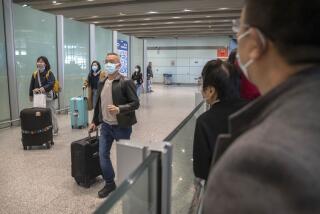Nationalists Say Support Is Building on Mainland : Taiwan Reports Gains From China Visits Policy
- Share via
TAIPEI, Taiwan — A new policy allowing residents of Taiwan to visit relatives in China has strengthened the position of the Nationalist Party in its decades-old struggle with the Chinese Communists, a spokesman for the Taiwan government said this week.
“We have developed a new sense of confidence that we are really taking bold action vis-a-vis mainland China,” said Shao Yu-ming, director of the government information office. “We feel that we have gained much, and we haven’t found much to lose.”
About 10,000 residents of Taiwan have visited China since the beginning of November, when Taipei eased a 38-year-old ban and allowed anyone except government employees and members of the military to travel to the mainland to visit relatives.
The visits have had the dual effects of strengthening support on Taiwan for the Nationalist government and building pressure for change in China, Shao said.
This, he said, is largely because such travel spreads knowledge on both sides of the Taiwan Strait of how prosperous Taiwan is compared to the mainland. Also, he said, newspaper polls have shown that the relaxed travel policy has strong popular support in Taiwan.
Visits to China by people from Taiwan “certainly will produce what the mainland Chinese Communists love to call ‘spiritual pollution’, “ Shao said. This is a phrase used in China to criticize what are considered to be unhealthy capitalist and Western influences.
The Nationalist government took refuge on Taiwan in 1949, after losing to the Communists on the mainland in China’s civil war. About 2 million people fled to Taiwan along with the Nationalists, and it is primarily these people who have relatives in China. About 85% of Taiwan’s 19.5 million people are native Taiwanese descended from people who came to the island from China generations ago.
With China’s gradual opening to the world since President Richard M. Nixon’s 1972 visit, the large number of visitors from abroad has been a major influence encouraging internal demands for change, Shao said.
“This kind of person-to-person contact for the last 15 years or so is one of the major reasons for public discontent with the system, and also for the so-called spiritual pollution question, and the (pro-democracy) student riots (of late 1986 and early 1987),” he said. “This new wave of visitors from Taiwan will simply deepen the development of that trend.
“I believe that if this trend continues for the next 10 or 20 years--and it will continue--it will produce a significant result on both the form and substance of Chinese communism. . . . We want them to emulate and adopt our system, bit by bit, step by step.”
The Taipei government will remain committed to the ultimate reunification of Taiwan with the mainland, but this will come only after political change in China, Shao said.
“We will only accept reunification if communism is removed,” he said. “When and how China’s reunification is going to take place depends on how fast and how genuine is the disappearance of communism from the soil of China.
“We feel that time is on our side. The longer we compete, the better position we’ll be in, because the gap between the two sides across the Taiwan Strait is being widened every day.”
Asked how long it would take to achieve Chinese reunification on Taipei’s terms, Shao replied: “It took us 90 years to get rid of the Mongols of the Yuan Dynasty (who conquered and ruled the Chinese empire). It took us 268 years to get rid of the Manchus (a non-Chinese ethnic group that ruled China from the mid-1600s to the early 1900s).
“The Chinese Communists have had 40 years so far. I don’t think they will last very long--not so long as the Mongols or the Manchus.”
More to Read
Sign up for Essential California
The most important California stories and recommendations in your inbox every morning.
You may occasionally receive promotional content from the Los Angeles Times.










